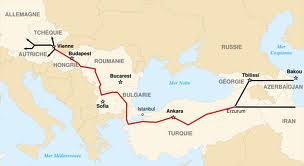Platts
Turkey would support a proposal for a pipeline to carry gas from the second phase of development of Azerbaijan's Shah Deniz gas field to Europe, a spokesman for the energy ministry said Monday.
The proposed pipeline would be in competition with the EU-backed Nabucco pipeline project.
The pipeline proposal was announced Thursday in Istanbul by Rovnag Abdullyev, president of Azeri state oil and gas company Socar, as the Anatolian Transit Gas Pipeline Project. He gave no further details.
The spokesman explained that Turkey and Azerbaijan were working together to develop the proposed pipeline but that no definite decisions had been taken on where the line will start and end or on what the capacity will be.
Broadly it will run from Turkey's eastern border to its western one, and will carry 16 billion cubic meters/year of Shah Deniz gas which Azerbaijan has agreed to export to Turkey and Europe, he said. It could utilize existing sections of Turkey's main east-west transit line in addition to the newly constructed line, he added.
The spokesman also confirmed that the new pipeline could carry gas from Baku to eastern Turkey using the existing 20 Bcm/year South Caucasus Gas Pipeline but added that no definite decision had yet been taken and it is unclear whether such a move would require a new agreement with Georgia.
Despite the proposed pipeline closely following the route of the EU-backed Nabucco project, the spokesman confirmed that Turkey was still offering support to both Nabucco and to the two other pipeline projects to carry gas from Shah Deniz to European markets, the Depa- and Edison-backed ITGI project and the EGL-, Statoil- and E.ON-backed Trans Adriatic Pipeline, both of which are expected to carry the gas to Italy via Greece.
Turkey still supported all three projects, he said.
The BP-led consortium developing the Shah Deniz field will make the final decision as to which pipeline will carry the gas, he said. He did, however, concede that Azerbaijan, owner of the field and a consortium member through Socar, and Turkey as the transit country and a consortium member through TPAO, have considerable influence on the final decision.
He also pointed to the criticism of the size and cost of the Nabucco pipeline project, which has been planned to carry 31 Bcm/year of gas despite no sources other than the 10-16 Bcm/year of Azeri gas being available for some years after Nabucco is scheduled to start.
MEDIA REPORTS ON BULGARIA TRANSIT DENIED
The spokesman also denied reports in the Turkish media quoting Bulgarian energy minister Traicho Traikov as claiming that Bulgaria and Turkey had reached an agreement to transit the Azeri gas via Bulgaria.
"We have an agreement in principle, but no details have been finalized," he said. No decision had been taken as to whether Azeri gas would go to Europe via Bulgaria or via Greece and Italy, he added.
The announcement of the new pipeline comes only weeks ahead of the expected announcement by the Shah Deniz consortium as to how it plans to transport its gas to European markets.
The three competing projects -- Nabucco, ITGI and TAP -- were invited to submit their final proposals to the consortium by October 1, before which consortium leader BP announced its own proposal to carry the gas to markets in eastern and southeastern Europe through Turkey and the Balkans via a combination of existing transit lines, the capacity of which can be expanded, and sections of new line.
Initially criticized by Turkey as being too late to be considered, the BP proposal looks very similar in both intent and scope to the planned TANAP project, although it is still unclear to what extent the two could overlap.
BP officials were scheduled to meet with Turkish energy ministry officials Monday, a BP official said without confirming the subject of the meeting.
Source:
http://www.platts.com/RSSFeedDetailedNews/RSSFeed/NaturalGas/8605945

Hiç yorum yok:
Yorum Gönder